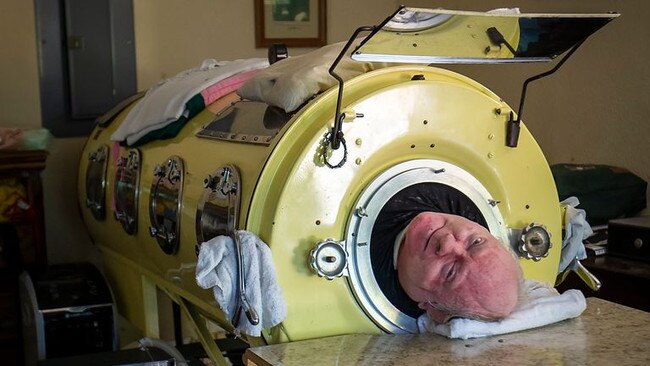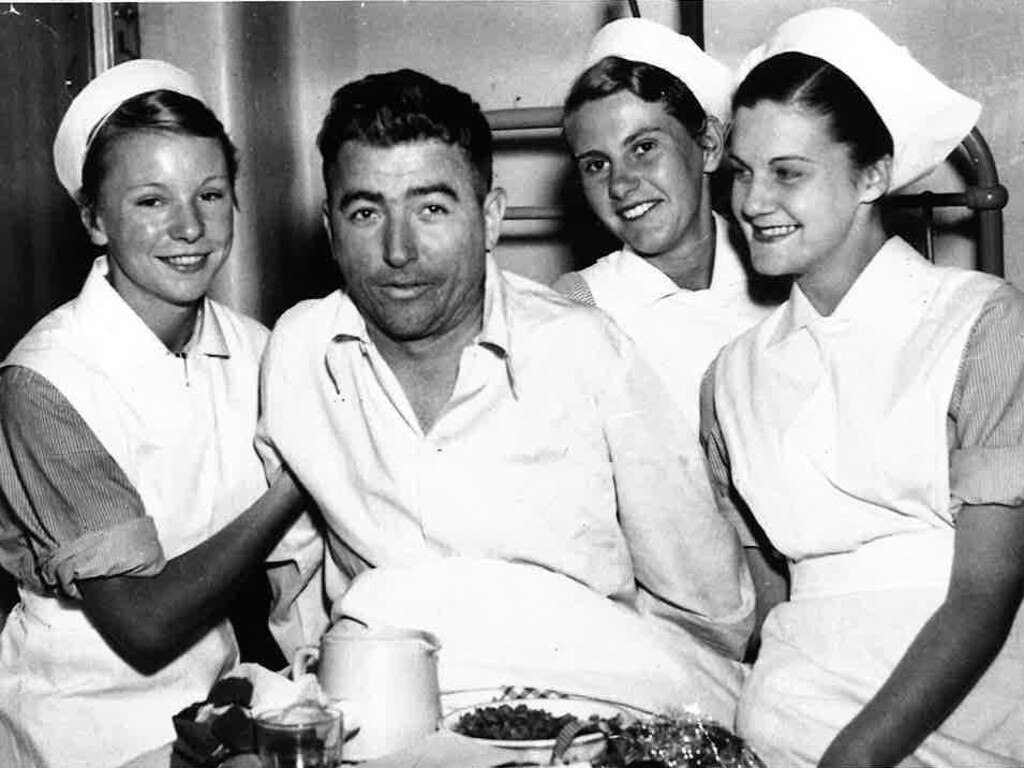Schoolboy written off as dead became the lawyer in an iron lung
Paul Alexander’s life of bravery and resilience delivered results few of us can imagine. And he did it all confined for 70 years.

OBITUARY
Paul Alexander Lawyer.
Born Dallas, Texas, January 30, 1946; died Dallas, March 11, aged 78.
The Covid lockdowns – particularly Melbourne’s record-breaking confinements – will be debated for decades. The financial setbacks are obvious; the impact on 2020’s year 12 students stranded at home and taught lightly by improvised online systems less so.
Paul Alexander lived long enough to experience two lockdowns, but it was the first that left its mark.
In the summer of 1952, the eastern half of the US suffered a heatwave like no other. Dallas was hotter still with a month’s worth of days that summer above what we then measured as 100F (38C). But the streets of the biggest city in Texas were empty. Its pools, parks and playgrounds were shut. They had not been closed by politicians, it was just prudence.
People chose to stay away from others in the relative safety of their homes as the last of the polio epidemics of the first half of the 20th century swept through the industrialised world – Britain, Australia and the US were particularly hard hit with thousands of children crippled and killed. Ironically, these came about because, experts now believe, our excellent first-world sanitation denied our kids the chance to develop naturally acquired immunity.
Polio has been with humanity for millennia and it is peculiar to us. No animals suffer from it. And it is nasty, even if most people who contract it remain unaware of ever having done so. It is an enterovirus spread by airborne respiratory secretions, saliva and, sometimes, faeces. It will usually manifest itself, if it does at all, with a fever, runny nose, cough, rash or perhaps a sore neck. But for a solid minority it was a death sentence of a paralysed respiratory system.
No one knows how it was passed to six-year-old Dallas boy Alexander. But at the height of that heatwave he went home feeling unwell: he had a headache, a fever, his neck hurt. His mum sent him to bed. But when his condition deteriorated his parents drove him to Parkland Memorial Hospital (11 years later, Parkland would be where president John Kennedy died after being shot by Lee Harvey Oswald).
At Parkland Alexander was just another young Texan dying of paralytic polio. Doctors left him on a gurney in a corridor until the disease took its course, but one re-examined him and believed his life was possibly salvageable. They performed a tracheotomy to remove the mucal debris from his throat and a laboured, shallow breath returned.
He woke up on a narrow bed in a large, noisy metal can. These had been invented a few decades earlier and were known as iron lungs. There was a leather bellows at the end of the metal tube that pumped and created negative pressure, causing the patient to involuntarily “breathe”. Alexander wasn’t alone. Perhaps two dozen kids surrounded him, similarly entombed. They couldn’t talk but they would smile at each other. Until one of them died.
Alexander was there more than a year before his parents hired a generator and had that iron lung driven to the family home. While in hospital he had been shown what is known as glossopharyngeal breathing, a painstakingly slow system of swallowing air into the lungs that would later allow him to leave the lung for short periods.
Like our Covid kids, he was effectively home-schooled but needed to memorise the notes he could not write down. A bright and determined boy, he would paint pictures with a brush in his mouth as he sailed through primary and secondary schools that he never attended. He then studied law at the University of Texas and was admitted to the Bar in 1986.
All the while Alexander stayed in his iron lung typing on a computer keyboard, letter by letter, with what might best described as a plastic mallet – wielded from his mouth, of course. He ran cases, particularly in family law, for 30 years and was a legal advocate for those in his challenging position.
But, as did his parents, he looked on the bright side of life. Two months ago he opened a TikTok account and 330,000 people saw the video in which he insisted that “being positive is a way of life for me”. He was the last man on earth in an iron lung. Melbourne woman June Middleton, who died in 2009, survived more than 60 years similarly contained.
Towards the end, Alexander’s younger brother Philip would set up speakers next to the iron lung and, among other songs, would play the Steppenwolf classic as Paul shook his head and sang along to Born to be Wild.






To join the conversation, please log in. Don't have an account? Register
Join the conversation, you are commenting as Logout